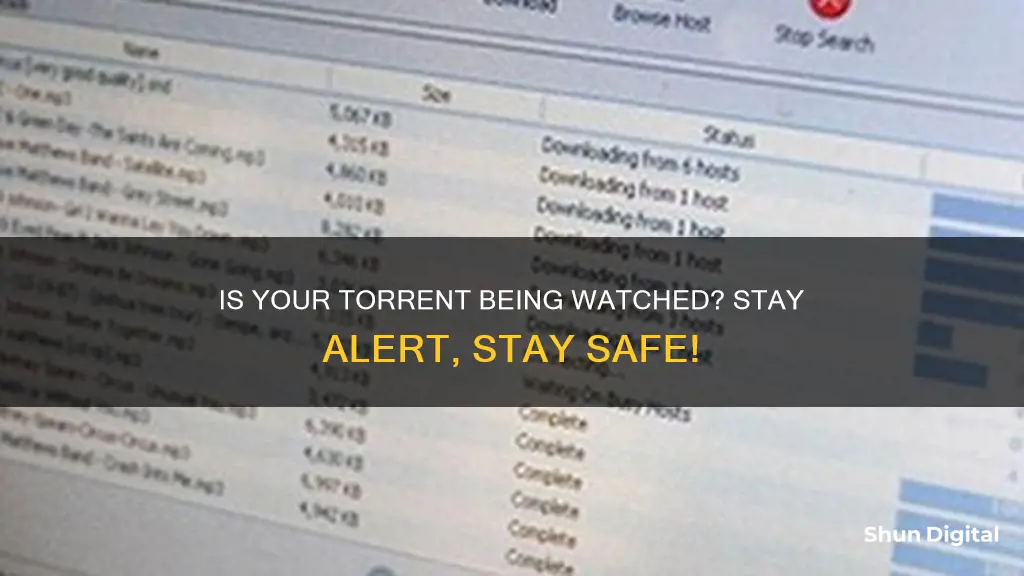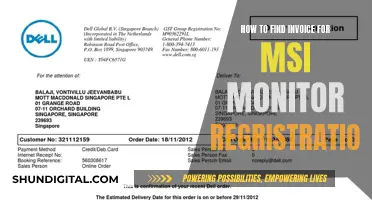
Torrenting is a popular way to download and share files over the internet. It is a form of peer-to-peer (P2P) file-sharing, where users connect to a swarm of other users who are uploading and downloading the same file. While torrenting has many legitimate uses, it is often associated with piracy due to the frequent sharing of copyrighted files. This has led to concerns about torrent monitoring and the potential risks involved in torrenting. In this article, we will explore the topic of torrent monitoring and provide insights into how users can protect their privacy and torrent safely.
| Characteristics | Values |
|---|---|
| IP Address Exposure | Your IP address is completely exposed while torrenting. |
| Monitoring Entities | Internet Service Providers (ISPs), Copyright Holders, Security Companies, Copyright Firms, Torrent Researchers, Data Brokers, Copyright Trolls |
| Monitoring Methods | Deep Packet Inspection, IP-based monitoring of torrent swarms, Swarm-based monitoring, IP-address tracking, DHT monitoring, Buying filesharing databases from data brokers |
| ISP Actions | Throttling, Blocking, Warning Letters, Connection Termination, Internet Throttling |
| Copyright Holder Actions | DMCA Notices, Threatening Letters, Lawsuits |
| Data Broker Actions | Selling data to rights holders and patent trolls |
| Preventative Measures | Use of VPNs, Disabling DHT & PEX, Use of ip-masking and encryption technology |
What You'll Learn

Your IP address is exposed
When torrenting, your IP address is visible to everyone else downloading or uploading that torrent. This poses a potential security and privacy risk that users should be aware of. Torrenting is a peer-to-peer (P2P) activity, which means that your download also involves you uploading to others. This is a critical distinction legally. If you're downloading, that may be illegal, but you're only creating a copy for yourself. However, if you're uploading, you're making it available for others, and the copyright holder can multiply the damages and then sue.
In order to connect to other peers, you need to know their IP address. In fact, these IP addresses are completely exposed for anyone to see. This means that your IP address is also exposed to everyone else in the torrent swarm. Peers (and torrent spies) can only see your public-facing IP address, which is usually assigned by your Internet Provider. However, you can change your IP address by routing your torrent traffic through a proxy or VPN server.
Torrent spies don't even need to connect to a swarm to harvest IP addresses. It's possible to snoop on peer-discovery methods like DHT and PEX. Large-scale monitoring of DHT is possible and efficient. Standard torrent trackers are also not immune. Malicious peers can snoop on non-HTTPS tracker connections or even create a honeypot tracker of their own.
There are several categories of organisations that closely monitor BitTorrent activity, including Internet Service Providers (ISPs), security companies, copyright firms, and other torrent researchers. ISPs directly monitor your internet traffic and some even block or throttle certain traffic types. In many countries, ISPs are required to keep IP address logs and spy on DNS queries and log your web-browsing history. They monitor torrent traffic for network optimisation and to reduce legal headaches. They can easily perform packet analysis and sophisticated Deep Packet Inspection to precisely identify what you're doing online.
Copyright holders also monitor torrents to calculate the impact of their copyrighted files being shared and to enforce their rights. They track users through IP-address monitoring and DHT monitoring, and by contracting with researchers and data brokers. Data brokers are third-party companies that don't directly hold copyrights but data-mine torrent swarms and then sell the data to rights holders and patent trolls.
How to Protect Yourself
If you don't want your identity and IP address to be tracked from torrent swarms, you can take steps to protect yourself. The best tool is a high-quality VPN service that will encrypt your torrent traffic and hide your real IP address from public view. Using a VPN will encrypt your traffic so your ISP can't spy on you directly or throttle your torrents, and it will provide an anonymous virtual IP address that can't easily be linked to your identity. Make sure to use a non-logging VPN service so that there's no metadata to link your virtual IP address to your real identity.
Monitor Size on Linux: A Comprehensive Guide
You may want to see also

Your ISP can monitor torrent traffic
Internet Service Providers (ISPs) are the gateway to the web. Whether you have broadband cable internet, Gigabit fibre-optic, or 4G wireless, you are connected through an ISP. Examples of ISPs in the USA include Spectrum, Fios, Charter, Xfinity, AT&T, and Verizon.
ISPs monitor your internet traffic, and can block or throttle (slow) certain traffic types. In many countries, they are also required to keep logs of IP addresses and web-browsing histories.
ISPs monitor torrent traffic for two main reasons:
Network Optimisation
Frequent torrenting uses a lot of data, and can slow down the network for other users. By throttling high-bandwidth activities like torrenting, ISPs can ensure that there is enough bandwidth for everyone.
Reducing Legal Headaches
Torrenting often involves the sharing of copyrighted files, which can cause legal problems for the ISP. To avoid this, they may monitor torrent traffic and send warnings to users, or try to block it altogether.
ISPs can use Deep Packet Inspection to analyse the content of your data packets and identify torrenting activity. They can also monitor your IP address and the amount of bandwidth you are using.
How to Protect Yourself
If you want to keep your torrenting activity private, you can use a VPN to encrypt your traffic and hide your IP address. This will prevent your ISP from seeing what you are doing online, and make it more difficult for them to identify you.
It is important to choose a VPN with a zero-logs policy, so that your activity is not recorded and stored. Examples of VPNs with this feature include ExpressVPN and NordVPN.
You can also use a proxy server, which funnels your torrenting traffic through a separate server, hiding your IP address from other users. Providers like Oxylabs offer this service without keeping records of your internet activity.
Another option is to use a Seedbox, which utilises the BitTorrent protocol to upload and download torrents, but does so through a Virtual Private Server. This means your ISP will only detect your use of the Seedbox, not any torrent sites.
While torrenting, it is important to remember that you are exposing your IP address to potential monitoring by your ISP and other entities. By using a VPN or proxy server, you can help to protect your privacy and avoid the legal consequences of downloading copyrighted material.
Monitoring Memory Usage: A Guide for iMac Users
You may want to see also

Copyright holders can monitor torrent traffic
Another way copyright holders monitor torrent traffic is through IP-address tracking. BitTorrent is a public, decentralised network, meaning that IP addresses of peers within a torrent swarm are visible to all participants. This allows copyright holders to easily monitor torrent activity and log IP addresses. They may also employ swarm-based monitoring methods such as DHT monitoring and contract researchers and data brokers to track torrent activity on their behalf.
Copyright trolls, or companies contracted by copyright holders, employ aggressive tactics to target torrenters. They locate illegal downloaders through their IP addresses and then approach the copyright owners to take legal action on their behalf. They often use intimidation and shame to extract settlements from alleged violators without going to court.
To protect themselves from monitoring, torrenters can use Virtual Private Networks (VPNs) to encrypt their traffic and hide their real IP addresses. A VPN can reroute internet traffic through a server in a different location, making it difficult for copyright holders to track the user's activity.
Monitoring Bandwidth Usage: Virtual Machine Management
You may want to see also

Data brokers can monitor torrent traffic
Data brokers are companies or individuals that collect and sell personal data. They are a type of organisation that monitors torrent traffic. They do not directly hold copyrights but instead data-mine torrent swarms and sell the data to rights holders and patent trolls.
Data brokers can access your IP address and public-facing IP address when torrenting. This is because BitTorrent is a public protocol by design, and a decentralised network, meaning you connect to other participants directly rather than downloading from a central server. This means that to connect to other peers, you need to know their IP address, and your IP address is exposed to them.
Data brokers can also access your data by buying it on the grey market, or from other commercial sources. This can include credit card providers and retailers, as well as public records.
Data brokers can also access your data through your internet history. If you spend a lot of time on social media, data brokers can access your personal information from your posts, likes, quizzes taken, and websites visited.
Data brokers can also access your data if you have agreed to share it when signing up for a new account or customer program.
Data brokers sell your data to companies for marketing and advertising, fraud detection, loan offers, and people search sites.
You can take steps to protect your data from data brokers, including using a VPN, deleting unused applications and accounts, and increasing your privacy settings.
Monitoring User Activity on Arris Cable Modems
You may want to see also

Use a VPN to protect your privacy
Torrenting is commonly used for pirating movies and shows, which is illegal. However, torrenting itself is not illegal and is also useful for sharing and downloading large files. If you are torrenting legally, you can still get into trouble. Your Internet Service Provider (ISP) can throttle your internet speed if they see that you are torrenting files. This is because torrenting uses a lot of data.
Using a VPN prevents your ISP from finding out about your torrenting activity. A VPN, or Virtual Private Network, is a type of software that creates an encrypted tunnel between your computer and a network. This hides your internet activity from your ISP.
Picking the Right VPN
Not all VPNs allow torrenting, so it is important to double-check that the VPN service you choose permits it. A good VPN should also have strong encryption protocols, a kill switch, the ability to torrent, a privacy policy with minimal logging, and good speeds.
How a VPN Protects You
A VPN allows you to communicate over a public, unsecured, unencrypted network privately and safely by establishing secure, encrypted connections. It routes data from your computer through servers in other locations and scrambles it to make it unreadable to bad actors (like hackers) who may want to spy on your activity.
A VPN encrypts, or scrambles, data so that a hacker can’t see what you’re doing online. It forms a tunnel between your computer and the VPN server and hides important information like your IP address, browsing history, credit card information, and downloads. The tunnel cannot be penetrated, and the VPN connection is private.
How to Torrent with a VPN
- Pick out a VPN service.
- Check that your VPN is working and that your data is fully encrypted, end-to-end.
- Enable the kill switch.
- Visit a torrenting site and search for the content that you want.
- Download the file.
Benefits of Using a VPN for Torrenting
Using a VPN will make your online activity more secure and private while keeping your data from getting monitored by your ISP or other people. It can also prevent your ISP from throttling your internet speed.
Risks of Not Using a VPN for Torrenting
If you expose yourself to torrenting without a VPN, you may face consequences such as ISP throttling or legal issues. Additionally, torrenting by itself is risky because you are connecting directly to random internet users, and your network will have a record of their IP address. There is a lot someone can do with your IP address to harm or take advantage of you.
Connecting Monitors Without HDMI: Alternative Ways Explored
You may want to see also
Frequently asked questions
There is no sure way to tell if a torrent is being monitored. However, if it is a popular torrent, it is more likely to be monitored.
The consequences of being caught torrenting depend on the circumstances and your location. You may receive a warning letter, face internet throttling or connection termination, or even be sued or imprisoned.
You can use a Virtual Private Network (VPN) to hide your online activity from your Internet Service Provider (ISP) and encrypt your traffic. It is recommended to use a VPN that doesn't keep logs of your activity and isn't based in a country with a legal system that can be used to demand customer records.
Yes, there are alternatives such as Usenet, a paid service that allows you to download files from centralized servers instead of a network of peers. Streaming services like Netflix, Amazon Prime, and Hulu are also legal and safe alternatives.
Torrenting itself is not illegal, but downloading copyrighted material without permission can lead to legal consequences. Additionally, torrent sites may contain malware or adware, so it is important to use reputable torrent clients and scan downloads for viruses.







